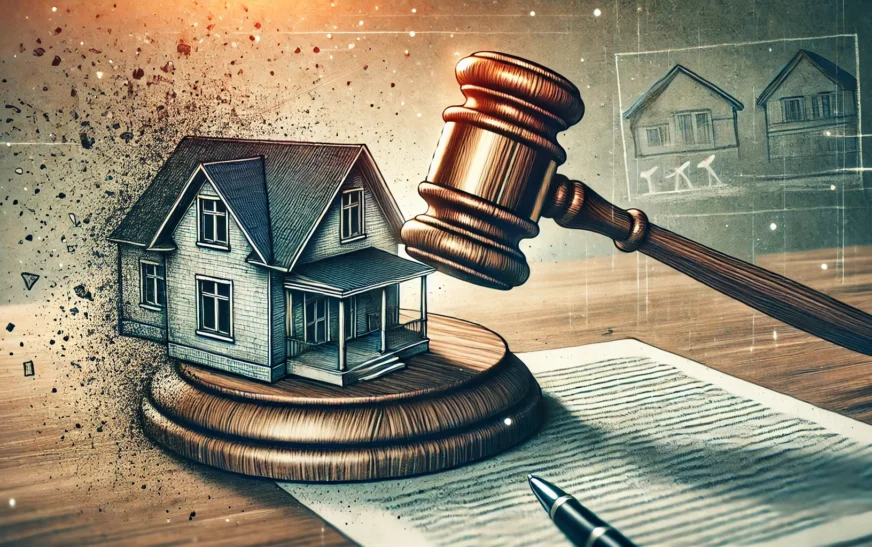The 72 Sold lawsuit has emerged as a significant legal battle in the real estate industry, raising serious concerns about the marketing practices employed by the company. With homeowners across the country increasingly relying on innovative real estate services to sell their properties, the 72 Sold lawsuit brings to light the potential risks and pitfalls of these modern approaches. This article delves deep into the 72 Sold lawsuit’s, exploring the allegations, the legal proceedings, updates, and the broader public reaction, including discussions on platforms like Reddit.
What is the 72 Sold Lawsuit?
The 72 Sold lawsuit’s revolves around accusations that the company’s marketing practices were deceptive, leading homeowners to believe that their homes would be sold within 72 hours of listing. The lawsuit alleges that 72 Sold’s advertisements and promotional materials misled consumers by emphasizing a guaranteed sale within a specific timeframe without adequately disclosing the conditions and limitations that could affect the sale’s speed and success.
The 72 Sold lawsuit’s has garnered widespread attention, particularly on online forums like Reddit, where users have shared their experiences and opinions about the company. The case continues to develop, with regular updates providing insights into the legal arguments from both sides and the potential impact on the real estate industry.
The Allegations: Deceptive Marketing Practices
The core of the 72 Sold lawsuit’s lies in the allegations that the company’s marketing practices were deceptive. Homeowners who engaged with 72 Sold believed that their homes would be sold within 72 hours, as advertised. However, many found that their homes remained unsold long after the promised timeframe, leading to frustration and financial difficulties. The lawsuit claims that 72 Sold’s marketing created unrealistic expectations, ultimately misleading consumers.
Misleading Advertising in the 72 Sold Lawsuit
One of the primary accusations in the 72 Sold lawsuit is that the company’s advertising was misleading. The plaintiffs argue that 72 Sold’s promotional materials prominently featured the promise of a 72-hour sale, creating the impression that the company could guarantee a quick sale for any property. However, the 72 Sold lawsuit’s contends that this promise was not backed by sufficient evidence and that the timeframe was not achievable for many homeowners.
The 72 Sold lawsuit’s highlights the discrepancy between the company’s marketing and the actual experience of homeowners. The plaintiffs claim that the 72-hour promise was a marketing gimmick designed to attract clients, rather than a realistic outcome. This aspect of the 72 Sold lawsuit has been a focal point in legal proceedings and public discussions.
Omission of Key Information in the 72 Sold Lawsuit
Another critical component of the 72 Sold lawsuit is the allegation that the company omitted important information in its marketing. The plaintiffs argue that 72 Sold failed to disclose the conditions that could impact the speed and success of a sale, such as market conditions, property location, and the seller’s flexibility on price. The 72 Sold lawsuit’s asserts that these omissions prevented homeowners from making informed decisions about whether to use the service.
In the 72 Sold lawsuit’s, the plaintiffs allege that the company’s failure to provide full disclosure about these critical factors constitutes deceptive marketing. The 72 Sold lawsuit emphasizes that transparency is essential in real estate transactions, and the company’s lack of full disclosure misled homeowners who believed they were guaranteed a quick sale.
High-Pressure Sales Tactics in the 72 Sold Lawsuit
The 72 Sold lawsuit also accuses the company of employing high-pressure sales tactics to push homeowners into signing contracts without fully understanding the terms and conditions. According to the 72 Sold lawsuit’s, the company’s representatives often emphasized the benefits of the service and downplayed the risks, creating a sense of urgency that led homeowners to make hasty decisions.
These high-pressure tactics are a significant point of contention in the 72 Sold lawsuit’s. The plaintiffs argue that the company’s sales strategies were designed to close deals quickly, even if it meant that homeowners were not fully aware of what they were agreeing to. The 72 Sold lawsuit’s claims that this approach further exacerbated the misleading nature of the company’s marketing practices.
Legal Proceedings and 72 Sold Lawsuit Updates
The 72 Sold lawsuit’s has been a complex legal battle, with both sides presenting detailed arguments and evidence. As the case has progressed, there have been several key updates that have shaped the direction of the lawsuit.
The Plaintiffs’ Arguments in the 72 Sold Lawsuit
The plaintiffs in the 72 Sold lawsuit have built their case around the allegations of deceptive marketing practices. They argue that the company’s advertisements and promotional materials misled homeowners by promising a 72-hour sale without providing adequate information about the conditions that could affect the sale’s speed and success. The 72 Sold lawsuit also emphasizes the omission of key information and the use of high-pressure sales tactics as evidence of the company’s deceptive practices.
In addition to seeking financial compensation for the losses they incurred, the plaintiffs in the 72 Sold lawsuit’s are asking the court to require the company to change its marketing practices. This could include clearer disclaimers in advertisements, more transparency about the conditions that impact the sale process, and a more thorough explanation of the fees and costs associated with the service.
72 Sold’s Defense in the 72 Sold Lawsuit
In response to the allegations, 72 Sold has defended its marketing practices, arguing that they are not deceptive and that the company has always been transparent about the nature of its services. The company contends that the 72-hour timeframe is a goal rather than a guarantee and that reasonable consumers should understand that the speed of a sale depends on various factors. The defense in the 72 Sold lawsuit may point to disclaimers in the company’s advertisements and contracts that clarify the conditions under which a sale might take longer than 72 hours.
72 Sold’s legal team in the 72 Sold lawsuit’s has also argued that the plaintiffs are simply dissatisfied with the outcomes of their sales and are attempting to blame the company for market conditions that were beyond its control. The defense asserts that the company provided all necessary information to homeowners before they signed contracts and that the plaintiffs’ dissatisfaction does not equate to deception.
Court Proceedings and 72 Sold Lawsuit Updates
As the 72 Sold lawsuit has progressed, there have been several important updates that have shaped the case. These updates have included court rulings on motions, the admission of evidence, and the testimony of witnesses. Each update in the 72 Sold lawsuit’s has provided new insights into the legal strategies of both sides and the potential outcomes of the case.
One significant update in the 72 Sold lawsuit’s was the court’s decision to allow the plaintiffs to present additional evidence related to the company’s marketing practices. This evidence included internal communications and documents that the plaintiffs claim show that 72 Sold was aware of the misleading nature of its advertisements. The inclusion of this evidence has added a new dimension to the 72 Sold lawsuit, potentially strengthening the plaintiffs’ case.
Another key update in the 72 Sold lawsuit was the testimony of former employees who claimed that they were instructed to use high-pressure sales tactics to close deals quickly. This testimony has been a crucial aspect of the plaintiffs’ argument that the company’s marketing practices were designed to exploit homeowners’ desire for a quick sale. The defense has challenged this testimony, arguing that it is based on the opinions of disgruntled former employees and does not accurately reflect the company’s practices.
Public Reaction and the 72 Sold Lawsuit on Reddit
The 72 Sold lawsuit has generated significant public interest, with many people turning to online forums like Reddit to discuss the case. On Reddit, users have shared their experiences with 72 Sold, offered their opinions on the lawsuit, and debated the merits of the allegations. The 72 Sold lawsuit Reddit discussions have provided a platform for homeowners, real estate professionals, and legal experts to weigh in on the case.
72 Sold Lawsuit Reddit Discussions
The 72 Sold lawsuit has been a popular topic on various Reddit forums, with users expressing a wide range of opinions about the case. Some users have shared their own experiences with 72 Sold, with some reporting positive outcomes and others expressing frustration with the service. These personal accounts have added a human element to the 72 Sold lawsuit Reddit discussions, providing insights into how the company’s marketing practices have affected real people.
Other users on Reddit have focused on the legal aspects of the 72 Sold lawsuit, debating whether the company’s marketing practices were truly deceptive or simply a case of consumers misunderstanding the service. The 72 Sold lawsuit Reddit discussions have also touched on broader issues related to consumer protection, transparency in real estate transactions, and the role of the courts in regulating business practices.
Key Points from 72 Sold Lawsuit Reddit Discussions
Some of the key points that have emerged from the 72 Sold lawsuit Reddit discussions include:
- Transparency and Disclosure: Many Reddit users have emphasized the importance of transparency and full disclosure in real estate transactions. They argue that companies like 72 Sold should be required to clearly explain the terms and conditions of their services, including any potential drawbacks or limitations. The 72 Sold lawsuit’s has highlighted the need for clearer communication between companies and consumers.
- Consumer Responsibility: Some users on Reddit have pointed out that consumers also have a responsibility to educate themselves and ask questions before signing contracts. They argue that while companies should be honest in their marketing, consumers need to be proactive in understanding what they are getting into. The 72 Sold lawsuit’s Reddit discussions have sparked debates about the balance between consumer responsibility and corporate transparency.
- Impact on the Real Estate Industry: The discussions on Reddit also highlight concerns about the potential impact of the 72 Sold lawsuit on the real estate industry. Some users worry that increased regulation and scrutiny could make it harder for companies to market their services, while others believe that stricter standards are necessary to protect consumers. The 72 Sold lawsuit’s Reddit debates have underscored the potential ripple effects of the case on the broader industry.
Broader Implications of the 72 Sold Lawsuit
The 72 Sold lawsuit is not just a legal battle between a company and a group of homeowners; it has broader implications for the entire real estate industry. The case raises important questions about how real estate services are marketed, the level of transparency that is required, and the protections that should be in place for consumers.
Impact on Marketing Practices
One of the most significant potential outcomes of the 72 Sold law-suit is a change in how real estate companies market their services. If the plaintiffs succeed in their claims, it could set a precedent that requires companies to be more transparent and cautious in their advertising. This could lead to a shift away from bold, attention-grabbing claims and towards more measured and factual marketing.
The 72 Sold lawsuit’s could also prompt real estate companies to include more detailed disclaimers in their advertisements, clearly outlining the conditions that could affect the speed and outcome of a sale. While this could help prevent future lawsuits, it could also make marketing more complex and less effective in attracting potential clients.
Consumer Protection and Legal Standards
The 72 Sold lawsuit also has implications for consumer protection and legal standards in the real estate industry. If the court rules in favor of the plaintiffs, it could lead to stronger regulations and enforcement of consumer protection laws. This could include stricter oversight of real estate advertising, as well as new requirements for transparency and disclosure.
On the other hand, if 72 Sold wins the case, it could signal to other real estate companies that aggressive marketing tactics are permissible, as long as they include some level of disclaimer. This could lead to a continuation of the status quo, with companies using bold claims to attract clients while relying on legal protections to defend against lawsuits.
Lessons for Homeowners
For homeowners, the 72 Sold lawsuit serves as a reminder of the importance of due diligence and caution when selling a property. While the promise of a quick sale can be enticing, it’s crucial to fully understand the terms and conditions of any service before signing a contract. Homeowners should ask questions, seek independent advice if necessary, and carefully review all documentation to ensure they are making an informed decision.
The 72 Sold lawsuit also highlights the importance of consumer awareness and education. Homeowners who are better informed about their rights and the potential risks of different real estate services are less likely to fall victim to deceptive marketing practices. By staying informed and proactive, homeowners can protect themselves and make better decisions when it comes to selling their properties.
Conclusion
The 72 Sold lawsuit is a complex and ongoing legal battle that has significant implications for the real estate industry, consumer protection, and marketing practices. As the case progresses, it will be closely watched by homeowners, real estate professionals, and legal experts alike, all of whom are interested in the outcome and its potential impact.
Whether the court ultimately sides with the plaintiffs or the defense, the 72 Sold lawsuit’s has already sparked important discussions about transparency, consumer rights, and the ethical boundaries of real estate marketing. It serves as a cautionary tale for both companies and consumers, highlighting the need for honesty, transparency, and diligence in the real estate market.
For those following the case, including the active discussions on Reddit, the 72 Sold lawsuit’s is more than just a legal dispute—it’s a reflection of broader issues that affect everyone involved in buying and selling homes. As updates continue to emerge and the court reaches its decision, the case will undoubtedly continue to be a topic of interest and debate, with far-reaching consequences for the real estate industry as a whole.
Also Read: Understanding Post-Void Residual (PVR) Scans: A Comprehensive Guide






